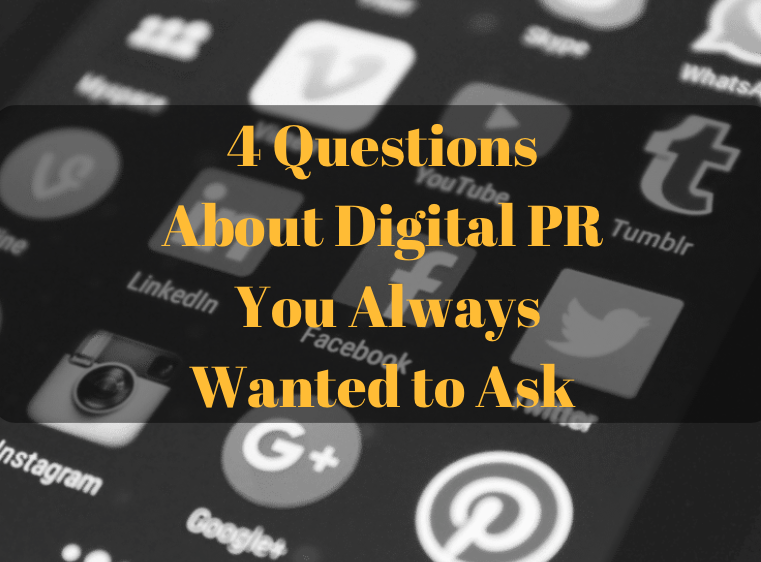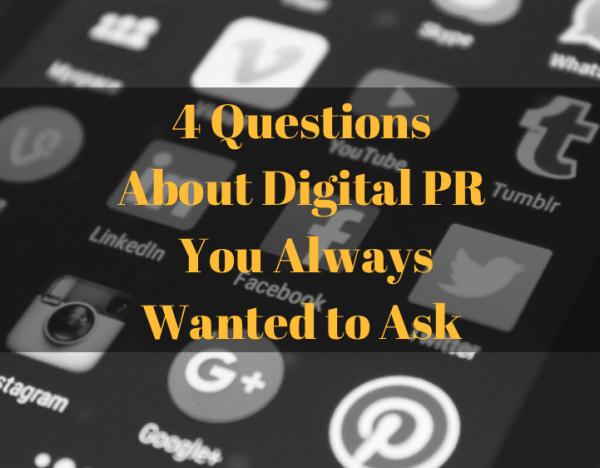Although online PR has recently been gaining popularity as an essential part of the digital marketer’s promotional mix, still a good number of digital marketers and business owners whom I meet don’t really get the idea behind it. Most of them have an overall understanding of what online public relations is but can’t really say what it could be used for, and how it work or benefits their business. In this post, I will try to provide some simple answers to the most basic yet frequently asked questions about digital PR – let’s start with the most fundamental one.
What Is Digital PR?
Digital PR can be used to achieve many different goals. My favorite definition of digital PR is the one that says it’s a communication tool that you can use to make people aware of your website, brand or product without directly selling them anything. Instead, digital PR uses journalists, online influencers and popular platforms and networks (e.g., news sites, social media, blogs and search engines) to spread the word about your company and maximize your brand’s visibility.
One of the biggest differences between digital and traditional PR is in the channel of communication and how you measure the impact on your business. Both forms of PR use different channels and techniques. Yet, the effectiveness of methods used by online PR is much easier (and thus less expensive) to measure: online PR does not always require comprehensive market research, which can cost thousands of dollars. In fact, monitoring brand mentions as well as your branded and direct traffic are among the best metrics for showing you your progress in online PR.
Thanks to comprehensive analytical tools such as Google Alerts, BuzzSumo, Moz’s Fresh Web Explorer, Ahrefs, BrandMentions and many others, it’s much easier to measure how content that mentions your brand spreads. For example, you can see how many times a post about your brand has been shared on social media channels, or how many sites referred to it in their content. And if any of those site’s mentions includes a link to your website, your site will benefit greatly in another way – your search engine ranking will increase.
Because of its indirect nature, if executed in a professional manner, a PR campaign can earn you a much better ROI than some classic marketing channels. A well-executed PR campaign can achieve great viral and word-of-mouth effects, in which a positive message about your company is spread thanks to shares from other people and businesses, not by paying for direct ads (which is also a more trustworthy form communication than ads).
Why Is Online PR Important?
Today, online PR has become an essential part of any brand’s promotional mix. It helps build a brand’s visibility and recognizability, quite often at a low cost. I believe that typical direct marketing methods are slowly becoming much less efficient compared to indirect methods – mostly because people prefer to be introduced to brands and new ideas via reliable media sources and well-known experts. This is where digital PR comes in, as it’s one of the best tools for building strong relationships, not only with your current and future customers but also with other brands and influencers. And long-term relationships are a great foundation for a stable and profitable business.
The importance of online PR is especially visible as the number of customers who believe in traditional forms of advertising (even those executed online) is dropping. Around three out of ten people both in the US and the UK feel that traditional banner advertising is way too distracting, and prefer to avoid sites with too many annoying banner ads. Static banners were given much more tolerance, since this type of ads is less intrusive.
To overcome this trend, companies are making online PR an important part of their online advertising strategy. Established businesses use it to reinforce their brand in the minds of consumers, while growing brands and start-ups can gain tremendous exposure even with limited resources and budget. While traditional advertising is about selling, PR is about helping you sell it better by building trust and a desire for your brand.
Marketers’ preference for PR is becoming obvious by the choices made by agencies and businesses. According to the PRCA Digital PR Report for 2015, an increasing number of businesses have started seeing channels like social media as platforms for customer service (56 percent) as opposed places where one has to deal with angry customers and employees (only 6 percent and 4 percent respectively). Similarly, the average in-house budget for investing in influencer marketing (for example, popular bloggers) has grown by 11 percent over the past two years.
This was followed by a tremendous growth in expectations that in-house marketing and PR departments have of PR agencies. The most affected digital marketing activities are SEO (20 percent), influencer outreach (18 percent), paid advertising (e.g., PPC – 14 percent) and online reputation management (ORM – 14 percent). Because the average company’s PR budget and overall understanding of what benefits PR can bring are growing, PR agencies will be continually entrusted with more work. Today, 82 percent of PR agencies work with influencers, 76 percent offer ORM, 54 percent offer SEO services and 47 percent offer PPC and other paid ads – the two latter tools being typically associated with marketing and not PR tools.
How Online PR Works?
Because of the aforementioned overlapping of PR and the traditional advertising tools, some marketers tend to misunderstand exactly what online PR does for businesses. For more details on how PR works in practice, you can read my post, in which I described how to deliver a PR campaign. Now, let’s move on to what a PR campaign can do for your business in terms of achieved results.
- Grow your brand awareness and provide you with tremendous exposure
The number one thing that your business can get from a well-executed online PR campaign is increased brand exposure and awareness, thanks to a large number of brand mentions in a short amount of time. By reaching out to influencers who have a huge following among your potential customers, you can introduce your brand to future customers using a voice that they will listen to and trust.
- Expand your business into untapped markets
By reaching out to communities that are relevant or complementary to your niche, you can gain access to thousands of potential customers. All you need to do is spark a desire for your product by introducing your brand, educating your customers, and providing them with shareable content that they can send to their friends and the people they follow on social media, creating a viral effect.
This viral effect, built with the help of influencers, can be used to enter and explore new, foreign markets. One of the most effective ways to do this is to use social media, Users of the most popular platforms, such as Facebook, Instagram or Twitter, come from different international markets and often follow influencers from various countries. The strategy of reaching to influencers with an international following has been used to great success and has helped build many multi-million businesses almost overnight.
One of the most notable and recent examples is Filip Tysander and his now $180 million watch business and brand – Daniel Wellington – which he built in less than five years. His company did not invest in any traditional forms of advertising, and their success relied on social media alone. Moreover, the Instagram account of Daniel Wellington’s brand has grown by over 1.2 million followers in one year, from 850,000 to 2.1 million. Below, you can see the effects of just one article from Business Insider. This article about Daniel Wellington has a tremendous engagement of over 383,000 people!

- Protect your reputation by turning bad news into PR stories.
One of my favorite recent examples of overcoming potential black PR is Moz (a software-as-service company focusing on inbound and analytics software) and the action they took after laying off 28 percent of their employees. Naturally, such move by a widely recognized company could quickly turn into an outbreak of negative PR.
To prevent this (and to help its employees), the company decided to start a great campaign called #hiremoz to help those who lost their jobs find new employers. This has not only benefited the former employees but also attracted a massive number of positive mentions of the company across social media, influential blogs, news sites and marketing forums. An excellent example of their campaign effectiveness is their #hiremoz hashtag – tweets that use it have received almost 4 million impressions – this does not include impressions of other content that have been shared and created on other social media platforms, news sites, and blogs.

- Improve your SEO and get more traffic
Considering the massive number of links that a company can gain overnight thanks to a good PR campaign, the strong relationship between SEO and PR is evident. Let’s get back to the Daniel Wellington example. Because of its spectacular success, the brand has very quickly gained not only tremendous social media exposure (which it already had) but also got noticed by some of the biggest news outlets, including Forbes, Business Insider and many blog influencers.
It has also been discussed on marketing forums as a great example of what a good use of influencers and a good strategy can achieve. A lot of those mentions included a link to the website and its Instagram account, helping boost both in search engine results. As you can see below, Bloomberg did not forget to link to the website.

How Do PR and SEO Work Together?
The last commonly asked question is about the relationship between PR and SEO. I have already said that PR can have a tremendous influence on SEO in terms of backlinks, but that’s not the only thing that is bringing them closer.
When I mentioned spending statistics, I said that it’s hard to show separate data for online PR, because it uses many tools that are also utilized by standard digital marketing techniques. Just like with links in SEO, you want your mentions in your PR campaign to be as high-quality as possible (and of course, you want a lot of them). To get them, you have to develop relationships with bloggers, influencers, editors and journalists.
In fact, influencers with whom you want to connect will often search for your brand to see who you are and whether you are worth establishing a relationship with and paying attention to. The same applies to customers who see your brand mentions in a news article or on their favorite social media platform. Without SEO, your PR campaign may not be as beneficial; with good PR, you can greatly increase your search engine rankings – the benefits are mutual.
If people who search for you don’t like what they find, they may quickly move on to other things, forgetting about the PR message they have just read. This is even more important if you have a lot of negative PR which, if found online, can put off your potential customers.

